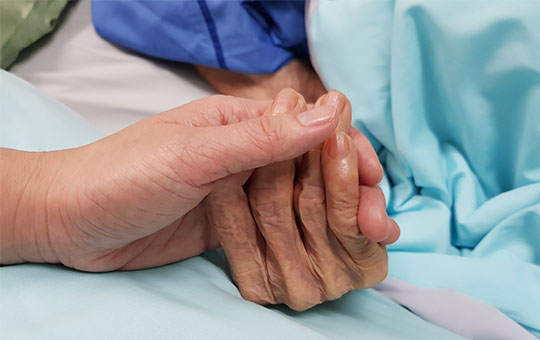News and updates on today's conference focusing on Falls Prevention & Management in Older People on falls prevention and management in older people with a focus on ensuring effective and resilient falls prevention activity.
Driving improvement through national guidance, national and local audit
• findings from the latest National Audit of Inpatient Falls report
• moving from snapshot audits to continuous audit
• focusing on patients who sustain a hip fracture while in hospital
• how the Falls and Fragility Fractures Audit Programme can support improvement activity
• implications for falls prevention in older people

Speaker: Dr Julie Whitney
Clinical Lead, National Audit of Inpatient Falls, Consultant King’s College Hospital and Lecturer at King’s College London.
Julie is a clinical academic physiotherapist specialising in ageing, with a particular interest in falls, frailty, cognitive impairment and rehabilitation interventions.
Julie began her talk by saying "Hospital should be a place of safety, but research has shown that the outcome for a patient fracturing their hip in hospital is very poor" "Is this because they are sicker and frailer? or is it the way they are being looked after? This is something to think about".
She continued by saying "What do we do about it?" "In hospital for any patient aged over 65, we must assume they have a risk of falls".
Julie also talked about the focus at her trust for 2024, some of which are "Avoiding deconditioning, good management for delirium and good patient care which helps with falls prevention".
Improving falls education, awareness and exercise in older people
• understanding the impact of the pandemic and lockdown on physical activity in older people
• educating patients and the public to understand why falls happen, how to get up from a fall and how to reduce the risk of falling
• working with patients to improve strength and balance and ensuring an inclusive approach
• working with people with dementia: the use of life stories to complete risk positive care plans

Speaker: Mr Tim Allardyce
Clinical Director - Surrey Physio - Registered Osteopath and Chartered Physiotherapist
Tim Allardyce is a Registered Osteopath and Chartered Physiotherapist with 21 years’ experience, who has worked at the top end of sport. Tim is a non-medical prescriber and injection therapist, but he has a keen interest in rehabilitation.
Tim began by saying "As we age our muscles get weaker, we can also have poorer balance, loss of proprioception, visual impairment, dizziness, environmental hazards and some medical conditions"
Tim discussed the pandemic and how this had an affect on falls and what he believes to be an increase in falls, he said "The pandemic increased sedentary behaviour, people suffered the psychological effects of isolation, reduced access to community classes and excercise facilities and left people more isolated which can cause a rapid decline in health"
Tim then went on to say "What can we do as health professionals? "One thing is to educate patients". "Education on nutrition, sleep, excercise and physical activity, which is vitally important, we also need to ask patients about falls and observe their gait & balance" "I also like to teach techniques to patients of how to get up from a fall".
Medication management to reduce falls: Frailty, Polypharmacy and prescribing
• understanding which medications contribute to falls and syncope
• frailty, falls and polypharmacy
• what an aged body does to a drug and a drug does to an aged body
• optimising medications safely
• tools to support safer prescribing
• assessing medications within falls services and clinics
• understanding when falls is a side effect of medication

Speaker: Dr Owen Ingram
Consultant Geriatrician, Maidstone & Tunbridge Wells NHS Trust
Dr Owen Ingram (FRCP, MBBS, MA Cantab) is a Consultant Physician and Geriatrician. Since completing his clinical training in 2019 he has been working as an Acute Geriatrician at Tunbridge Wells Hospital.
Owen started his session by talking about polypharmacy, patients who are taking 5 or more regular medications. He said "Medication reviews are very important, there are some medications at higher risk of falls that some patients do not need to be on"
Owen went on to say "Instead of prescribing for the disease, prescribe for the quality of life of the patient, start off with low dose and increase. Try not to treat drug side effects with extra drugs" " We should not be scared to stop drugs in older people".
.jpg)
































